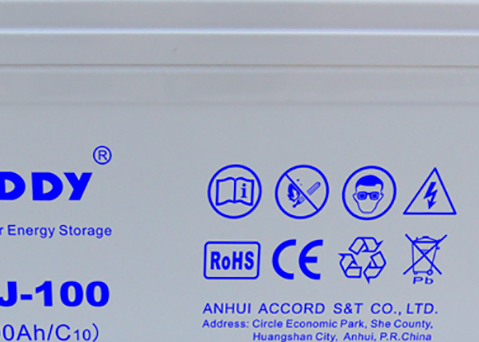The life of UPS lead acid batteries is a complex issue affected by a variety of factors. Generally speaking, the life span of UPS lead-acid batteries ranges from 3 to 5 years, but the specific life span will be affected by a variety of factors. First of all, the environment and conditions of use have an important impact on battery life. If UPS lead-acid batteries are often operated in high or low temperatures, or are undercharged or overcharged, the battery's life may be shortened. In addition, the battery's loading conditions and frequency of use can also have an impact on life.
In the uninterruptible power supply (Uninterruptible Power Supply, or UPS) system, lead-acid batteries, as a kind of energy storage device, play a vital role in guaranteeing the continuity and reliability of the power supply.The life of UPS lead-acid batteries is affected by a variety of factors including the type of battery, use environment, maintenance methods, and the depth of discharge. Understanding the life of UPS lead-acid batteries and how to properly maintain them to extend their life is extremely important to users.

UPS lead-acid batteries are generally divided into two types: Valve-regulated lead-acid batteries (VRLA) and open-ended lead-acid batteries. The VRLA battery is currently the most widely used battery type in UPS systems, and it includes two forms of gel batteries and AGM (Absorbent Glass Mat) batteries. Among them, AGM batteries are widely used due to their good high-speed discharge performance and long design life. Open-ended lead-acid batteries are inexpensive, but their use in UPS systems is diminishing due to the need for regular replenishment and maintenance, and their susceptibility to acid mist pollution.
Generally speaking, the official nominal service life of UPS lead-acid batteries is usually between 3-5 years. However, in actual use, the battery life is affected by a variety of factors, making its service life has a large fluctuation. In practice, some batteries may need to be replaced within 2 years, while some better quality, well-maintained batteries may be used for more than 5 years. Therefore, understanding and mastering the methods to extend the life of UPS lead-acid batteries has a practical economic value for users.
UPS lead-acid battery life is affected by a variety of factors, including the following aspects:
1. Use of the environment: the use of batteries environment has a great impact on its life. Ideally, the battery operating temperature should be kept at 20-25℃. Excessively high or low temperatures will shorten the life of the battery. In addition, humidity and dust in the environment can also adversely affect battery life.
2. Charging conditions:Correct charging is essential to extend battery life. If the charging current or voltage of the battery is not suitable or the charging cycle is not set properly, it may cause the battery to be overcharged or undercharged, thus affecting its life.
3. Depth of Discharge: The depth of discharge (DOD) of a battery also significantly affects battery life. Generally speaking, the deeper the depth of discharge, the fewer cycles the battery will have. Avoiding deep discharge as much as possible can effectively extend battery life.
4. Maintenance: Regular maintenance of UPS lead-acid batteries is an important measure to extend the battery life. Check the appearance of the battery is not damaged, regular cleaning of the battery interface, and to ensure that the charging system is working properly, etc., can effectively avoid battery performance degradation.
In order to maximize the service life of UPS lead-acid batteries, the following measures can be taken:
1. Maintain the appropriate ambient temperature: To the extent possible, the UPS and the battery can be used in the same way. 47}} Try to install the UPS and batteries in a temperature controlled environment. High temperatures accelerate battery aging, while low temperatures may reduce the effective capacity of the battery.
2. Appropriate Charging Settings: Set the correct charging voltage and current limiting parameters according to the type of batteries and the manufacturer's recommendations to avoid overcharging and undercharging.
3. Control the depth of discharge: Try to control the depth of discharge of the battery to avoid the battery being in a low charge state for a long time. Timely charging can effectively slow down the decay of battery capacity.
4. Regular Maintenance and Inspection: Regularly inspect and maintain the UPS system and batteries, replace damaged batteries in a timely manner, keep the battery terminals clean, and ensure that the batteries are arranged in an orderly manner and well ventilated.
For UPS lead-acid battery life battery maintenance situation is also a key factor in determining its life. Regular checking and cleaning of the battery connectors to ensure voltage stability, as well as avoiding the use of poor quality chargers and avoiding frequent overcharging and undercharging, etc., can extend the life of UPS lead-acid batteries. Overall, although the general life span of UPS lead-acid batteries is between 3 and 5 years, the exact life span will vary depending on the environment and conditions of use and maintenance. Therefore, in order to extend the life of UPS lead-acid batteries, users need to pay more attention in the use and maintenance process.
Although the average life expectancy of UPS lead-acid batteries is generally 3-5 years, it is entirely possible to extend the actual service life of the batteries to a much longer period of time through reasonable use and standardized maintenance. Considering the importance of the UPS system, the quality of the battery and the subsequent maintenance cost should be fully considered when selecting the battery, so as to ensure the stable operation of the whole system.